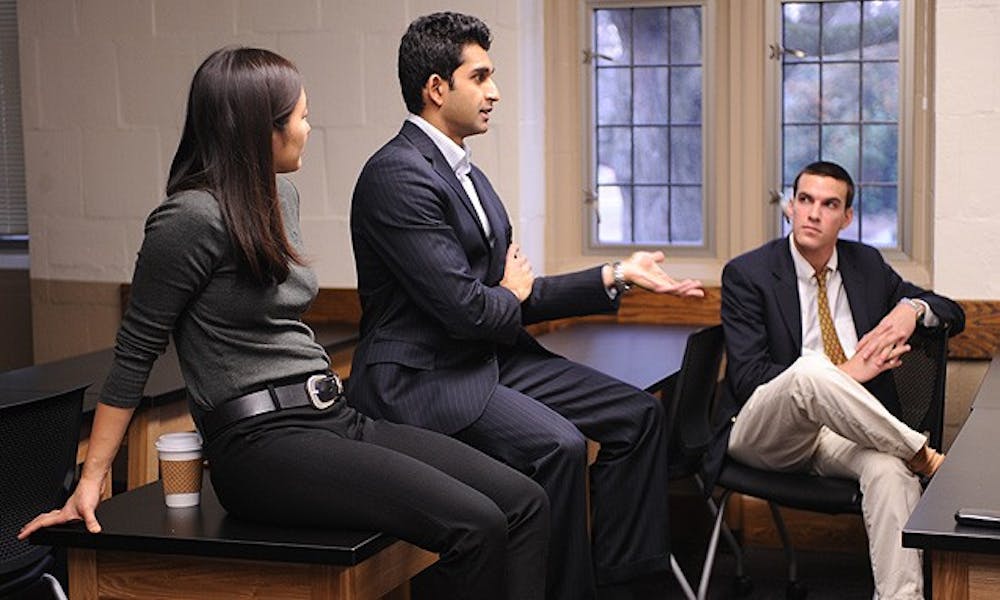In addition to completing their applications, recent Young Trustee candidates have made their way onto YouTube, imitated popular movies and posed with Duke basketball players in an attempt to draw in the most votes.
Whereas candidates did not campaign for the position before the introduction of the student body election, it has recently become the focus of most candidates’ efforts.
Now—after two Young Trustee student body election cycles—many leaders involved in the process have questioned certain components of an open election.
Current Young Trustee John Harpham, Trinity ’10, said the election process puts candidates at a disadvantage because it confuses them about their potential future role.
“During an election you are put in a relationship with the student body that is not at all the relationship with the student body you will have as a member of the Board of Trustees,” Harpham said. “The temptation is to present oneself as someone who will advocate for undergraduates.”
One of the most significant and time-consuming types of campaigning that has accompanied the shift to an open election is the endorsement process, which consists of candidates speaking to student groups and answering questions. Although some candidates have noted that the Young Trustee should not necessarily come with a set agenda, some have said that the endorsement process forces them to accommodate the interests of individual student groups.
Former Young Trustee finalist Chelsea Goldstein, Trinity ’10, said attempting to appeal to an interest group gives candidates the perception that they are running for a representative position as opposed to an informed board member with a student perspective.
“It’s a hard balance to strike when you’re not running to be a representative,” Goldstein said. “[When talking to groups and students] it’s hard not to tell them what they want to hear. It leads to a culture of false promises.”
Senior Ben Getson, one of this year’s Young Trustee finalists, said he was frequently asked about issues pertaining to Tailgate—a topic more relevant to the administration than to the Board of Trustees. He added that he was frustrated by some questions he encountered during endorsement meetings.
“What the average student wants to know is how you will represent them in the board room and make their lives easier for three years,” Getson said. “It somewhat twists the intention of the position.”
Many students in endorsement meetings have a limited idea of what the role of Young Trustee is, said former write-in candidate Brooke Kingsland, a senior. She added that the majority of questions she faced in endorsement meetings dealt with topics handled by the administration instead of the Board of Trustees, leading her to jokingly refer to the position she was campaigning for as the “Young Administrator.”
Duke Student Government President Mike Lefevre, a senior, said the endorsement process forces candidates to appeal to the goals and interests of individual student groups, instead of providing evidence of why they would make a qualified Trustee.
“In the end it comes down to typecasting the candidate who represents [a certain] interest,” Lefevre said. “It becomes platform-based even though that is not the position.”
Endorsements could make or break a candidate, he said, noting that endorsement meetings do not necessarily represent who a candidate would be as a Trustee.
“Endorsements get a lot of student groups involved. About 50 percent [of undergraduates] voted this year, and maybe 25 percent [of the total votes] came from endorsements,” Lefevre speculated. “[Many times] they vote based on the wrong criteria.”
Although finalists campaign and advertise their unique skill sets and boardroom experience in an attempt to express why they are most qualified, Harpham said they will have a difficult time truly understanding the role until they officially join the Board.
“Nothing that you can do as an undergraduate can prepare you for the role as Young Trustee,” Harpham said. “No matter where you start from, you will have lots of work to do. The only way for a student to become an effective Trustee is to wipe from your mind that you are beholden only to students.”
Get The Chronicle straight to your inbox
Signup for our weekly newsletter. Cancel at any time.

